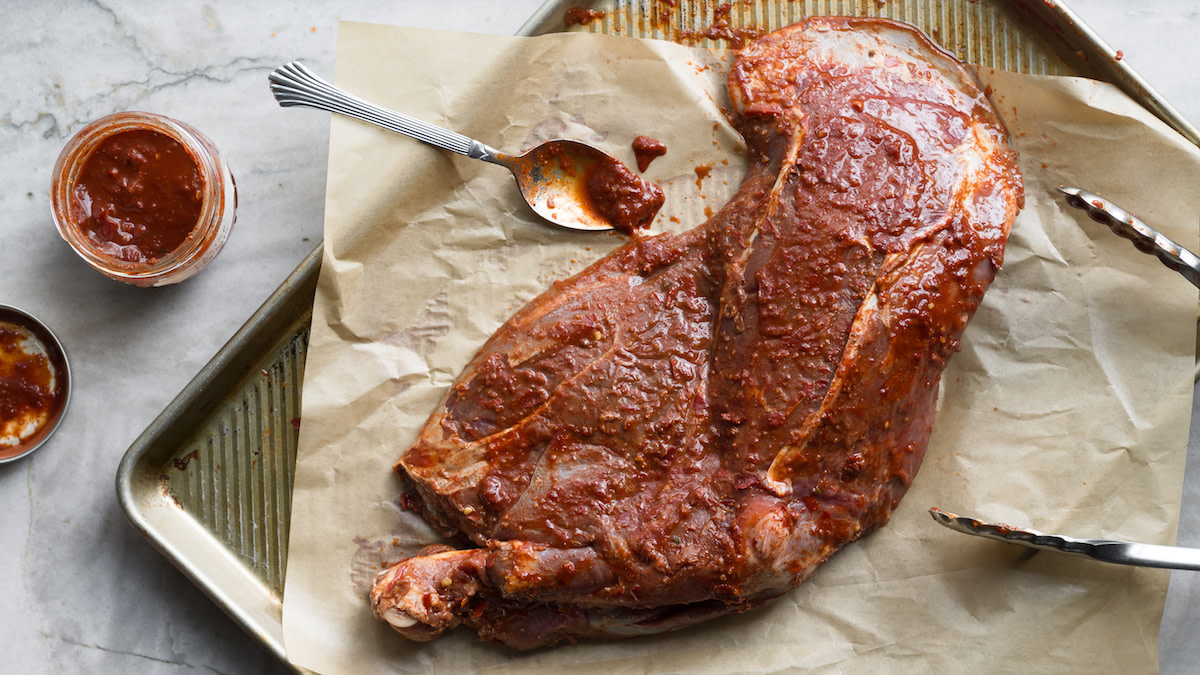
The use of marinades on wild game is a contentious topic. Some say they don’t actually tenderize meat, others claim they mask the naturals flavor, and a few feel they’re downright sacrilegious.
I’ll save the debate about masking “gamey” flavors for another day and instead dispel the myth that marinades are magical tenderizers. Scientists have demonstrated that besides salt, marinade ingredients don’t permeate meat no matter how long you soak it. Acidic elements in marinades like citrus can weaken tissue and have a mild tenderizing effect if you cut the meat thin or inject it with a syringe. Additionally, this is only helpful if all the silverskin and connective tissue are trimmed. But it’s better to think of marinades as an external treatment.
All of this is to say that marinades certainly have their place. You just need to know how and when to use them.
Why Use Marinades?
People have been using acidic liquids for cooking since the Renaissance, but their primary function then was brining more than tenderizing. Many meats can still benefit from marinades today, even if the sole purpose isn’t preservation.
The ultimate goal of a marinade should be to enhance and add flavor to meat, not to cover up the natural taste. Adding fresh herbs, sugar, peppers, spices, and other aromatics provide variety. It’s a great way to shake up the usual routines.
Most marinades contain sea salt, soy sauce, or Worcestershire sauce. Salt helps meat retain juices when cooked and thus enhances the meaty flavors. Most marinades aren’t as effective as brines, but they definitely make a difference for preserving moisture.
Marinades can also add some much-needed fat to otherwise lean wild game. Oil coats the meat with fat, which acts as a barrier to heat transfer and protects the meat when grilling. It also functions as an emulsifying agent that binds all the ingredients of a marinade together.
When to Use Marinades
I believe grilling and sous viding are the best cooking methods for utilizing marinades. For example, I love to coat a whole deer shoulder with chile paste before vacuum sealing in a bag and cooking sous vide. It’s an easy way to infuse flavor in the meat and juices.
Another interesting take is the Filipino adobo method that I recently used for cooking turkey tail. It involves marinating meat in vinegar, sugar, and soy sauce, then braising in the marinade. This will also work great with turkey thighs.
How Long to Marinade
Because marinades don’t penetrate far into the meat, there is no reason to let it sit for days. Eight to 14 hours will do the trick. Just be careful if using fruit. Pineapple, papaya, and kiwi contain protein-digesting enzymes that will turn the surface of the meat mushy if left to sit longer than 30 minutes.
Best Marinade Recipes
Ready to start cooking? Here are five of our favorite marinades for wild game.
Citrus Marinated Venison Fajitas
This is a classic Tex-Mex fajita that uses lime and orange juice in the marinade. The recipe calls for venison brisket, but really any cut of meat will work. I also use this marinade on ungulate hearts and wild bird breasts.
Garlic-Herb Venison Marinade
This is my go-to for steaks. It calls for lemon, rosemary, and garlic. It’s the perfect recipe for summertime grilling.
Buttermilk-Grilled Quail
Buttermilk is a great way to marinate small game birds such as quail. This recipe is Southern comfort at its finest. I like to grill with this recipe in warm weather and serve with potato salad.
Venison Heart Bulgolgi
This is a Korean barbecue recipe that involves marinating thin strips of deer or elk heart in a sweet and zesty marinade. It’s great to serve over rice or in lettuce cups.
Gamebird Shish Kabobs
Adapted from Middle Eastern cuisine, this recipe calls for marinating pheasants, turkey, or ruffed grouse in a flavored yogurt. It makes for a unique, delicious flavor.







